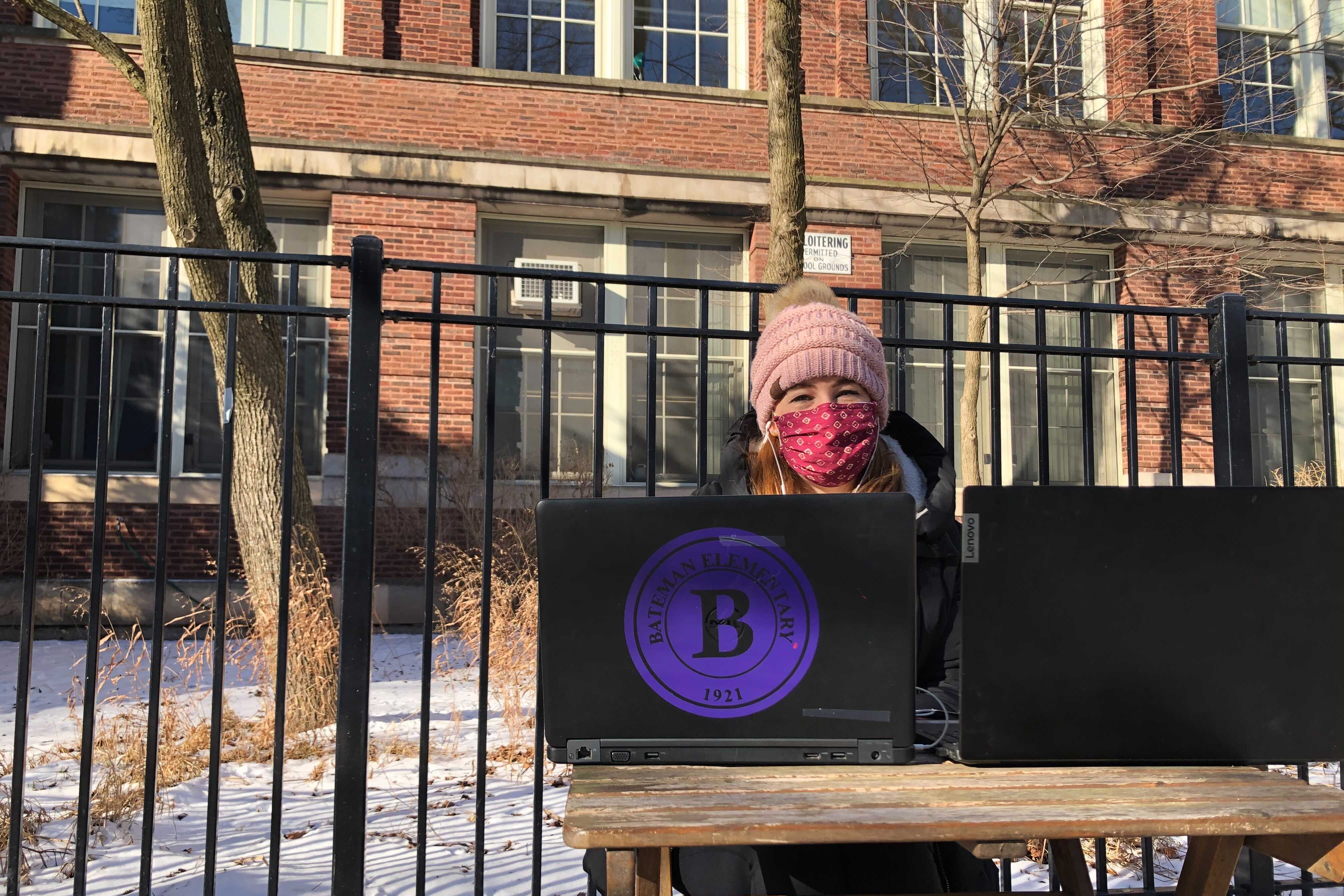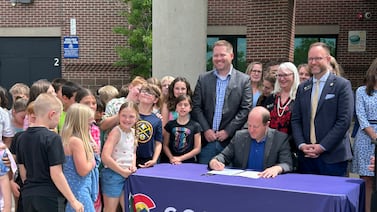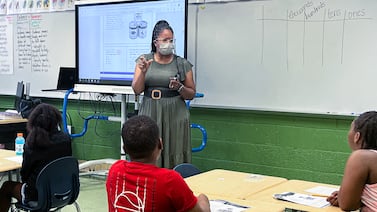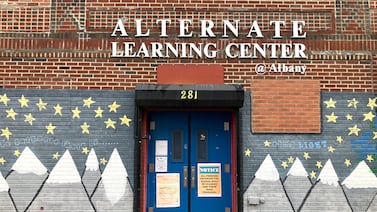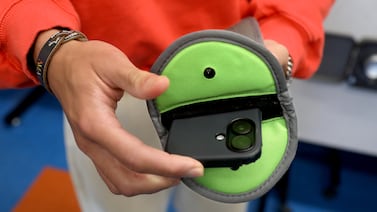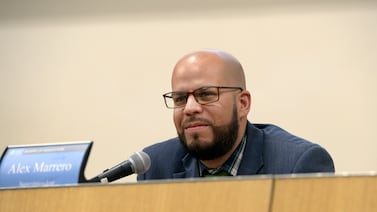Facing an impasse with its teachers union, Chicago will delay reopening schools for most elementary students until later this month and more gradually phase in students by grade.
Under the proposal, educators who teach prekindergarten and special education students with moderate and complex disabilities would be expected to return Monday, with students returning Tuesday.
The district said it will take disciplinary action against teachers Monday if they do not report to classrooms, an action that the union has previously said would provoke it to strike.
The union has not agreed to the delay — which would have students in kindergarten to fifth grade returning to campuses Feb. 22 and middle school grades back in classrooms March 1. Under the proposal, teachers for K-5 would be expected to return Feb. 16, and middle school teachers would report back Feb. 22. About 1 in 3 elementary students has said they planned to return.
Chicago and its teachers union entered the weekend still at a stalemate over the district’s push to reopen elementary schools. After the city set a series of deadlines and said the union missed them, the two sides remained at odds over teacher vaccinations, return dates, accommodations for staff to work remotely, and improvements to remote learning.
For families, meanwhile, the day brought lingering uncertainty, with the possibility of the city’s second teacher strike in 15 months still looming and the prospect of a return to classrooms unclear.
By Friday afternoon, neither side appeared to even agree whose turn it was to respond to proposals. Throughout the week, Mayor Lori Lightfoot expressed impatience with union leadership for stalling and taking an inflexible stance while the city “bent over backwards” to accommodate its demands. By Friday, she said her latest offer was the “last, best, and final.”
In a defiant message to members, union President Jesse Sharkey said that the city’s latest proposal did not cut it. He vowed teachers will continue to work remotely until there is a deal with the city.
“Three times in the past week, the mayor has drawn a line in the sand, and three times, our solidarity and our commitment has forced her and CPS leadership to step over that line,” he wrote.
What followed was a terse two-line email from the city that said it had yet to receive a formal response to its offer. The statement insisted the “ball is in (the union’s) court.”
Friday brought an element of deja vu to anyone who has followed Chicago’s reopening saga: sharp back and forth, twists and turns, and apparently intractable division on a number of issues that have stymied the negotiations.
A week of back and forth
Throughout the day, the union criticized the mayor’s hard-line negotiating position. At a press conference with Black educators Friday, Stacy Davis Gates, the union’s vice president, said that Lightfoot’s approach closed the door to further negotiation — a criticism that about a dozen elected city, county, and state officials echoed later in the day at a union-sponsored virtual meeting. (Several of those officials received funding from union-related political action committees in the past 12 months, according to campaign finance records.)
Gates argued that the union and its bargaining push deserve credit for the bulk of the safety procedures the district has laid out in recent weeks. That’s a claim city officials might dispute, but one that also acknowledges concessions on key issues the district has made at the bargaining table.
Areas where the two sides have reached compromise now include regular rapid testing of all staff as well as some students at 134 schools in areas hard-hit by COVID-19, contact tracing, ventilation, health and safety protocols such as personal protective equipment, and the establishment of school-level safety committees.
Those bodies, which the union proposed when it shared bargaining demands in December, would enforce safety protocols and, in the cases of multiple COVID-19 cases at a school, weigh in on closing a building altogether.
At least four crucial areas of dispute remain: the timing and logistics of educator vaccinations, a citywide metric that would trigger a districtwide closure, how many teachers should receive work-from-home accommodations and why, and the reopening timeline itself. The union has said it also wants to negotiate over reducing instructional time in remote learning, an issue that the mayor has said is a non-starter.
Chicago Public Schools said Friday that it had proposed to close individual schools if surveillance testing at any particular campus exceeds a positivity rate of 2.5% or if half of its schools had to take an operational pause. Sharkey, the union’s president, said Friday that proposal did not go far enough for the union.
On the issue of work-from-home accommodations, the city said it has issued 5,000 accommodations already, and that it would offer teachers who lived with high-risk family members the opportunity to move to the front of the line for a first-round vaccination. There appeared to be lingering disagreement over at what point in the vaccine sequence some teachers would have to report to work, with the city saying that its expectation is that vaccinated teachers would report to work 14 days after their first dose — and that any teacher who received a medical accommodation would return to campus by the end of the third quarter, presumably having been vaccinated. The vaccination for the coronavirus typically is given in two doses up to four weeks apart.
There had been some hope going into Friday that the two sides were close to agreement, more broadly, on a weekly vaccine set-aside for teachers. But on Friday afternoon, City Hall posted a video on the mayor’s social media channels that featured Lightfoot and Dr. Allison Arwady, the city’s top health official, giving a joint address to residents.
The union, they said, was still pushing to put teachers at the front of the queue — and that would directly impact everyone else. “If we agreed to (CTU’s vaccination) plan, it would mean that all of you would have to take a backseat to teachers who’ve been teaching remotely for 11 months,” Arwady said.
“It would stop vaccine distribution across the city for everyone else,” said Lightfoot.
Kindling longstanding trust issues
The mayor has consistently said that the union has “moved goalposts” and surfaced issues she believed were outside the scope of reopening, such as a rent abatement program for district families and defunding school police.
In a message to district employees, Lightfoot and schools chief Janice Jackson said the city had to stay firm on giving families an in-person option as soon as possible.
“Our children are suffering — especially our most vulnerable — and it’s resulting in absenteeism, failing grades, depression, isolation and more,” they wrote in an email. “We must act now to protect our children.”
For its part, the union has said the district only began to bargain in earnest “at the 11th hour” and it spent the latter part of the week trying to rally its allies.
At a union panel with Black educators on Friday, teachers referenced the closures of schools in predominantly Black communities over the past decade, historic underinvestment in Black and Latino neighborhoods, and what they described as the district’s failure to support and retain Black teachers. (According to a Chalkbeat analysis, by 2019, Chicago had lost a quarter of its Black teachers over a six-year period.)
“It’s very unfortunate for this institution to think we will trust them with Black lives,” said teacher Whitney Jean.
A similar theme of deep-seated mistrust that precedes the pandemic ran through a different virtual panel hosted by several parent advocacy groups, who have argued that the district has failed to seek enough input from families in designing and rolling out its reopening plan. At the event, parents argued the district should do more to improve virtual learning, which will remain a key part of the educational experience regardless of whether students return to school buildings a few days a week or not.
“CPS’s current plan will guarantee remote learning will suffer,” argued Jazmin Cerda, a parent organizer with the Brighton Park Neighborhood Council.
The groups presented a list of demands they said they developed with parent and student input, including more mental health resources and a major expansion of the city’s “learning hubs,” where the children of frontline workers can do virtual learning with adult supervision.

